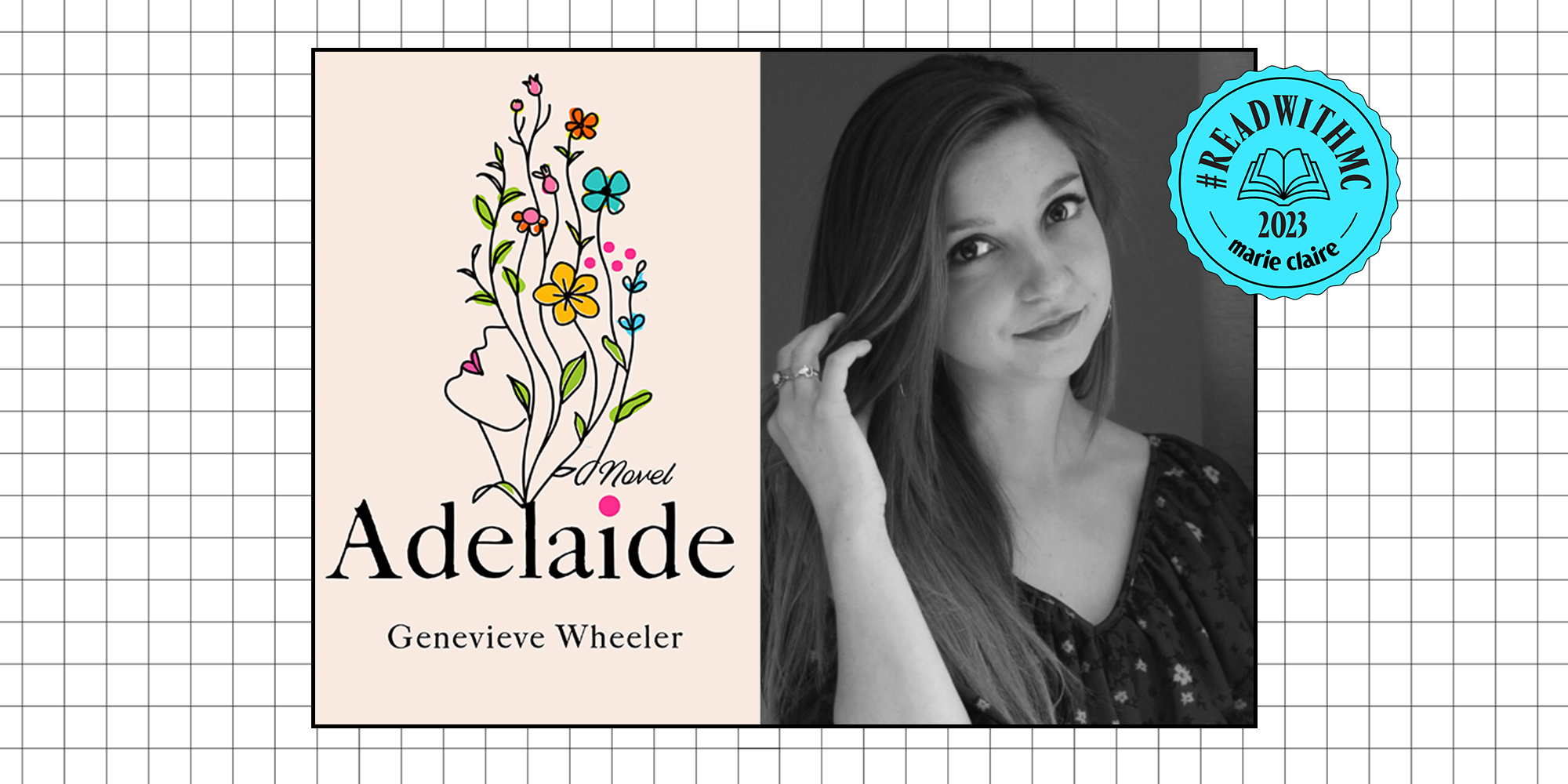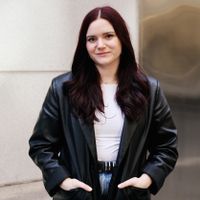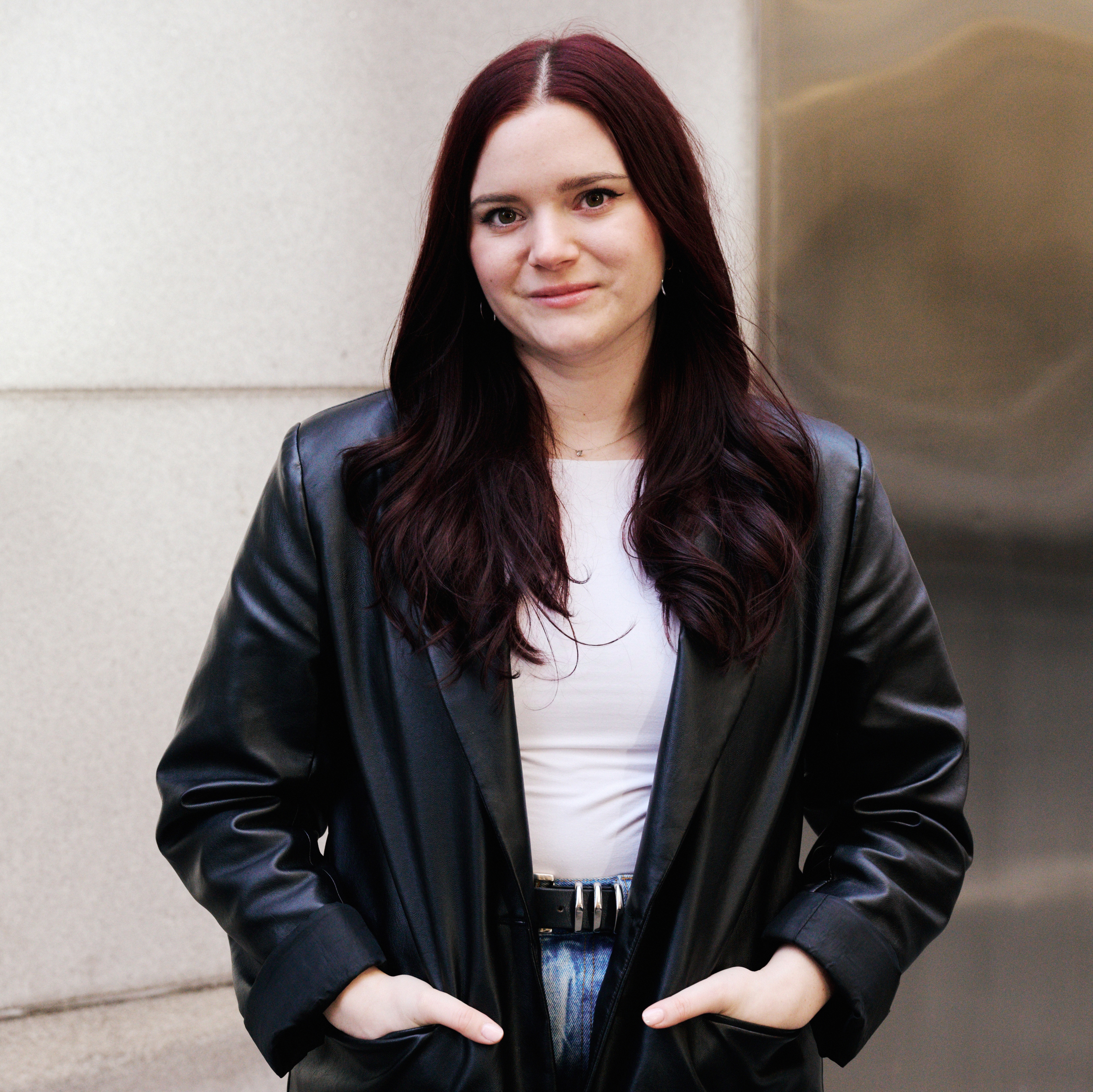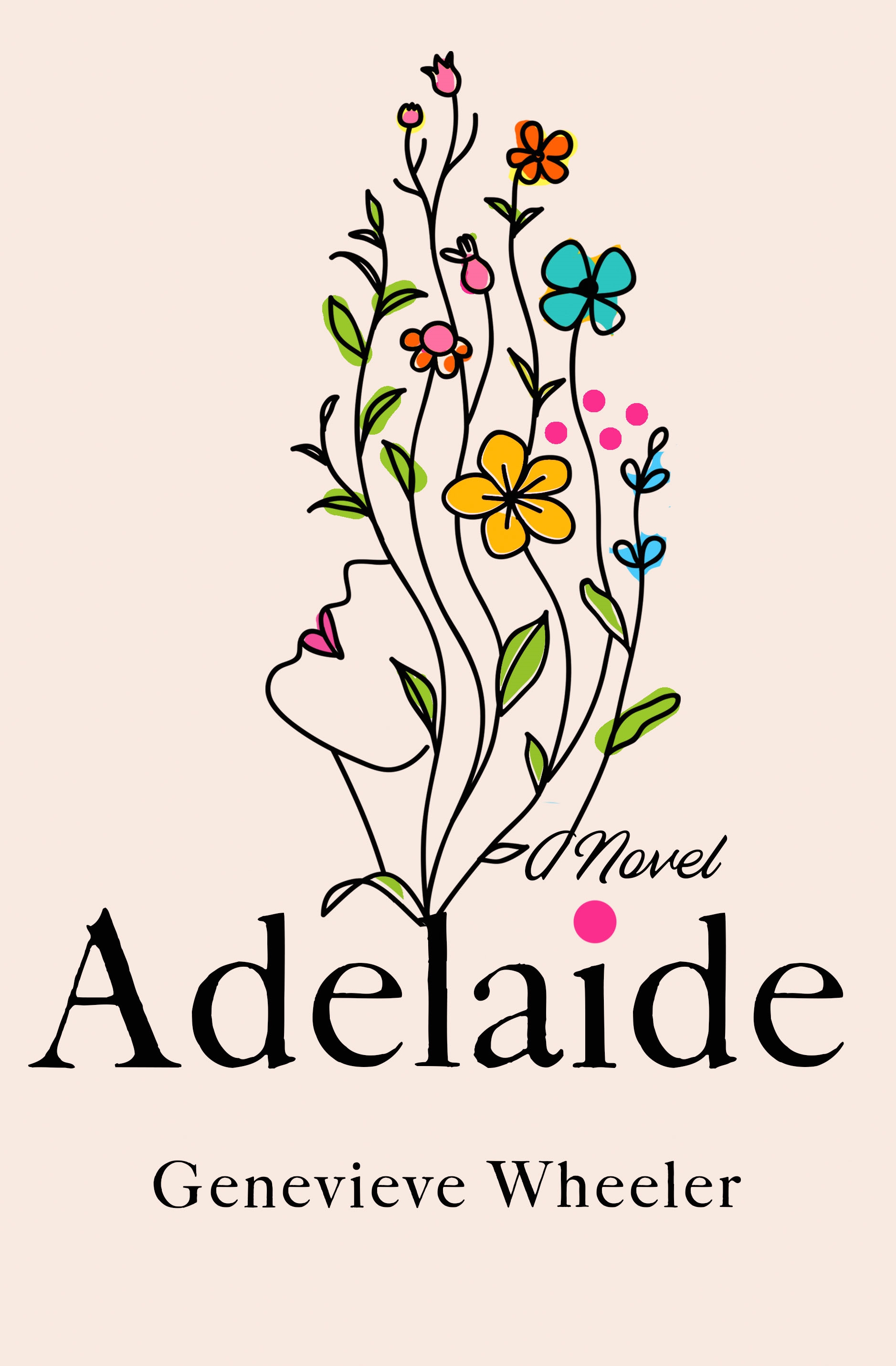'Adelaide' Is Our May Book Club Pick
Read an excerpt from Genevieve Wheeler's debut novel, here, then dive in with us throughout the month.


Welcome to #ReadWithMC—Marie Claire's virtual book club. It's nice to have you! In April, we're reading Genevieve Wheeler's Adelaide, a bittersweet, relatable story about a twenty-something American in London who badly wants the man she loves to love her back. Read an excerpt from the book below, then find out how to participate. (You really don't have to leave your couch!)
Two and a half years before she packed up her Brooklyn apartment and moved into that Highgate flat, Adelaide spent the most carefree semester of her life studying abroad in London. She’d always had a soft spot for the city, having lived on the outskirts for a few years growing up, but she’d never known that a metropolis could become a booming, integral character in your life. Not before then. It’s crazy, she’d tell friends over Skype. My baseline emotion is just contentment here. Who knew that was even possible? Her responsibilities were minimal and Hyde Park was at her doorstep. It was perfect.
At one point that semester, Adelaide threw on a navy dress covered in tiny white anchors and joined her friends at an open-air pub along the River Thames, eyes peeled for the Oxford versus Cambridge boat race. They drank bottomless pitchers of Pimm’s and lemonade and basked in that elusive little thing called the sun. Late that afternoon, tipsy and tanned, she saw him.
He was wearing a scarf and a blue button-down and Adelaide loved him instantly—all brown curls and razor-sharp jawline. Like a young Colin Firth. Stop drooling over that stranger, her friend said. You look like a drunken trout. She closed her mouth and stood up, steeling herself as she strolled over to approach him at the bar—two empty Pimm’s pitchers in her hand and no shoes on her feet (they’d been giving her blisters all day).
Hi, she said, tapping his arm. I’m so sorry, I just. I had to tell you. You look like a Disney prince.
Oh, um, hi, he said. That’s so nice. Thank you.
He gave Adelaide’s shoulder a friendly pat, then turned back to his group. But she had never forgotten his face.
Get exclusive access to fashion and beauty trends, hot-off-the-press celebrity news, and more.
She told this story over and over again in the years that followed.
When Adelaide would joke about her blundering lack of sex appeal and friends shook their heads in polite disbelief, this was the anecdote she would offer up. See? she’d say. I’m the type of person who approaches strangers and tells them they look like Disney princes without shoes on! It was humiliating and hilarious and very much Something Adelaide Williams Would Do. She never expected the prince to reappear in her life, patting her shoulder once more and introducing himself as Rory outside of the Old Vic theater.
Adelaide’s jaw dropped for a split second. How had she not connected the dots sooner? she wondered. How had she not recognized him from his photos? Oh my gosh, hi, I’m Adelaide, she said. It’s so good to meet you! Can I hug you? I’m going to hug you. Luckily, magically, Adelaide’s aggressively friendly disposition was seen as American charm in London, not a bunny-boiling red flag.
The beauty of a foreign accent, really. Rory chuckled and returned the hug, then puffed his chest out a little.
Shall we? he asked.
This was a habit of his. When nervous, he’d puff his chest out like a bird—an effort to seem bold or brave or confident—and say things like, Shall we? Adelaide was just so glad to be near him, next to him, with him (with! him!) that she’d melt and oblige each time. He could have asked this question at a cliff’s edge—gesturing to a rocky canyon below—and Adelaide would have gleefully replied, We shall!
But they weren’t at a cliff’s edge. Not yet. On this particular evening, he led them to a rickety Italian bar on Lower Marsh Street—one that smelled like roasting espresso and had creaky, wooden tables covered in ring stains. Before their date, Rory had texted to see if Adelaide preferred bustling pubs or cozy spots with fairy lights. She’d opted for the latter and, taking in the setting, was glad of her choice.
What can I get you to drink? he asked.
Oh, anything! I like all alcohol, she said, an unsuccessful attempt to seem nonplussed and low-maintenance.
Rory gave her a funny look but returned a few minutes later with two orange goblets of Aperol spritz, striped paper straws bobbing on the sides. Cheers, he said.
She decided not to tell him that they’d met before, to keep that delicious little secret to herself for now, fairly certain he didn’t recall.
Rory spent his gap year on a farm in the South of France, he explained. Studied at Cambridge. Worked in law for a little while. He took a year off to do pro bono legal work in Alabama, then spent a few weeks at film school in L.A.—Just for kicks—which inspired him to switch fields entirely. These days, he was working for a budding production company, and it was wild how much happier he was making films and shit money, wearing jeans and T-shirts to work instead of stiff gray suits.
She learned all of this as he peppered her with questions about her own life—about the States, her many moves, those months she spent au-pairing in Paris. He asked about her favorite shows on Netflix and the American snacks she missed most, gently teasing when she said she sometimes dreamt about eating Kraft Macaroni & Cheese and gooey summer s’mores and woke up with drool on her chin.
That’s not cute, she said. Let’s strike that from the record?
It’s hilarious and adorable, he said. You are hilarious and adorable.
They finished their first spritzes. Then their seconds. Then moved on to a shared bottle of the house red. Adelaide had never felt this instantly comfortable with a stranger, let alone one so cartoonishly handsome.
Fuck my feet, she texted her roommate from the bathroom. I’m going to have sex with this guy.
Of course you are, Madison replied. Celeste and I had been taking bets.
Around eleven thirty that night—four and a half hours after they’d met—the bar staff politely informed the pair that they were closing, and Would you mind if we cleared the table? They quickly finished their glasses of wine and Rory grabbed the door, leading Adelaide out of the bar and into the open air. She shivered.
Are you cold? he asked.
Just a little, she said. I’ll be fine.
I would offer you my coat if I had one.
It’s painfully clichéd, but darkness didn’t exist here, not in this little universe Adelaide entered when she first kissed Rory Hughes.
Instead, he wrapped his arms around Adelaide, rubbing her shoulders with the sleeves of his jumper. She was covered in goose bumps and wished she could take her own jacket off, just to feel his hands on her skin. He smelled of pine trees and fresh laundry; being near him felt like Christmas morning.
It’s a shame, really, he said, arms still enveloping hers. This street used to be all independent bookstores and locally owned coffee shops. Now it’s Costas and Boots. Gentrification, innit? Adelaide nodded. I’ve only lived around here for two years or so and it’s already changed so much. It’s sad to watch. This used to be a tea shop run by this lovely older woman. None of the crockery matched and everything was homemade. She nodded again. Why am I talking so much about gentrification?
I watched the same thing happen in my neighborhood in Brooklyn, she said. It’s hard to walk down the street and not think about it all the time. About what it used to be. Oof, capitalism.
They chuckled and reached the end of the street. Well, he said. I suppose you’re going this way.
Adelaide turned to the station, then turned back to Rory. He pulled her closer by her elbow, tucked his hand beneath her chin, brought her lips to his, and slipped his tongue inside her mouth.
And then, she remembers, she was on fire. It was well past eleven at night and the sun must have set hours earlier, but in her memory, standing on that street corner, the sky was bright. Birds chirping, clouds parted, sun shining. It’s painfully clichéd, but darkness didn’t exist here, not in this little universe Adelaide entered when she first kissed Rory Hughes.
You know, she said, pulling her lips a centimeter from his, I don’t have to go this way.
He hesitated. How about this weekend? he asked. Are you free on Friday?
It was Wednesday. She paused, looked up, trying to think through her plans. She and Madison were grabbing dinner with Celeste, but after that, maybe?
Oh no, Friday’s too soon, he said. I’m too keen, aren’t I?
I think I’m free later on Friday, she said. Let’s plan something. Text me?
Of course I will, he said. This has been lovely.
It has been. She paused. But did you, um, just turn me down?
He squeezed her hand and crossed the street, winking over his shoulder and leaving Adelaide to wonder if the entire night had been a fever dream. The sky was still bright. She stood there for a second, then reflexively dialed her best friend’s number.
Eloise, she said, I think I just met my soul mate.

Brooke Knappenberger is the Associate Commerce Editor at Marie Claire, where she specializes in crafting shopping stories—from sales content to buying guides that span every vertical on the site. She also oversees holiday coverage with an emphasis on gifting guides as well as Power Pick, our monthly column on the items that power the lives of MC’s editors. She also tackled shopping content as Marie Claire's Editorial Fellow prior to her role as Associate Commerce Editor.
She has over three years of experience writing on fashion, beauty, and entertainment and her work has appeared on Looper, NickiSwift, The Sun US, and Vox Magazine of Columbia, Missouri. Brooke obtained her Bachelor's Degree in Journalism from the University of Missouri’s School of Journalism with an emphasis on Magazine Editing and has a minor in Textile and Apparel Management.
